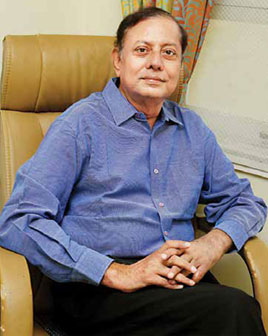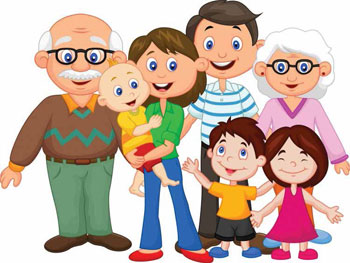
The world is changing at a fast pace. That is not surprising, as it is commonly known that the only thing permanent is change. Nature supports change as is evident from our progress from childhood to adulthood and finally to old age. But there are some changes in human behaviour which compel us to look back and ponder. These changes may not be too many but they are disturbing.
Recently there was a media report that one wellplaced NRI had not cared to know about his old and widowed mother for a considerable time and when he came back to her flat in Mumbai, he discovered a skeleton of the old lady. The skeleton was found when the flat was broken open.
Even the neighbours in that colony had no clue. The NRI admitted that the last occasion when he had talked to his mother on the phone was one-and-half years ago, and on that occasion, she had told him to either keep her with him or put her in a home for the aged, as she was feeling extremely lonely.
The incident noted above is testimony to the disturbing changes, which are taking place in our own families. The ancient Indian concept of family is depicted by the story of Shrawan Kumar, who carried his blind parents on his shoulders to take them on a pilgrimage to fulfil their desire.
The concept of our family used to be based on love and sacrifice. Firstly, parents used to bring up their children with a lot of affection and sacrificing their own material pleasure. Secondly, when children grew up to become adults, they did their best to repay the parental debit by providing both material and emotional support to their parents.
The system was so evenly balanced that all the members of the family had a role to play, and all of them were looked after. With the passage of time and with the advent of modernity, the width of the family started to narrow and nuclear families came on the horizon.
The change was accepted by our society as in most of the cases, the logic behind the rise of the nuclear families used to be job, business and profession in far-off areas of the country and in many cases even outside the country.
However, there used to be no grievance as parents and their now adult children living away had the emotional chord left between them. They met sometimes and stood by each other in times of need. Though joint families had broken down, the old parents and their adult children were emotionally together, living in two different parts of the world.
The new trend where adult children break the emotional chord with their old parents is painful. It is painful to see that people forget the love and sacrifice of their parents who made them what they are today. The new concept of evolving family is ‘Me and Mine’ which in many cases do not include the parents.
This issue requires our thought as it affects not only the concerned families but our society and eventually our nation. A person who has no love for his parents may logically have no love for his motherland. The motherland is equated with the mother, as both are related to our birth. Motherland is the land where we are born and mother is the person to whom we are born.
A family is happy if there is love in the family and similarly, a country is a progressive country if its citizens are patriotic and they have utmost love for their country. The family is the building block of our society and of our nation. If the building block is strong, the society and the country will be strong.
A family is happy if there is love in the family and similarly, a country is a progressive country if its citizens are patriotic and they have utmost love for their country

There are some serious side-effects when people become self-centred , devoid of love for other people. It gives rise to love for personal, material pleasure and consequently for accumulating more and more money. The lust for money becomes the one important reason for corruption and tax evasion. For such people, money becomes a substitute for the loss of love and emotional chord in the family. One wants to prove to himself that he is not a loser by losing the emotional chord with his parents. He tries to create an illusionary world around himself by buying so called friends with the help of his newly acquired money. But ultimately he suffers the most. He is not left with any true relationship to fall back on when he is stressed.
This leads to depression and sometimes even suicide. Recently, one young IAS officer who was the Collector of Buxar committed suicide caused by marital problems, as he had nobody to share his stress with. As we all know, history repeats itself, and so the young people today become old parents of tomorrow and their children will pay them back by the same coin. The cycle of pain goes on thus, while the actors change.
We saw above some glimpses of problems in relationships in families these days. Are only children to be blamed? What is the solution? Even parents have to share the blame.
The solution lies in teaching ‘samskar’ to children when they are growing up, and this is the responsibility of parents and teachers. Children today are not taught about our Indian culture and tradition. Earlier, older members in the joint family closely interacted with the growing children, and affectionately gave them lessons on our culture and traditions. Now when we have more nuclear families, there is no such system in place. Parents remain busy earning and managing the household. Things become worse when both the parents are working, and there is nobody at home to play, interact and guide the growing kids. The building of an affectionate bond between the parents and children suffers.
Modern lifestyles adopted by parents when they are busy with parties and meetings also minimises the quality time they have with their children. Children may not speak, but they become lonely despite the fact that parents have tried to give all material comforts to them. Upscale parents try conveying love for their children by spending money on them. The children get costly toys but parents are not around to play with them. Children learn from the parents that the most important thing in life is money, and once they grow up, their only objective is to earn more and more money. Children miss the emotional fondling by parents when they are kids and hence once they become adults, the emotional chord takes a back seat.
In schools and colleges teachers give the students more information based knowledge than wisdom. There are no classroom lessons on morality, on Indian culture, and patriotism. We have seen that in the topmost universities, slogans are raised to break our country these days. Getting a job or earning money becomes the only objective of students in most cases. Such children, when they turn adults with their own families become busy in their careers with no time for their old parents or for the country.
This does not happen in all cases, as there are still many households where children learn our culture and develop into balanced human beings. They continue to remain good children even when they have acquired their own families.
On the other side, adult children with old parents should introspect and find time for their parents. They now have small kids already, and will appreciate how their parents might have suffered many difficulties bringing them up.
They should think over the fact that they were working hard to earn for their children. Today their parents are old and they will leave the world anytime and so during that limited time should be kept happy.
Kids require the care of parents, as at that age they are physically dependent on them, and similarly, old parents are also dependent on children. Old parents require physical, emotional and material care.
Today you give love to your old parents and tomorrow your kids who will emulate you will give you back similar love and care. Parents are the best friends of their children, and they are the happiest when kids do well in their career. It is said that every father wants to see his children do better than him.
The discussion on this issue will go on and on, based on the personal opinion of each of us. But one thing on which we all will agree is that the actor in this family drama remains constant, though his perspectives change as he graduates from childhood to fatherhood and then to grandfatherhood.
Similarly, there will be other actors in the family. The difficulty mainly arises because of the communication gap and sometimes due to ego problems of the members of the family. Jealousy between siblings also becomes a cause of tension at times when parents are bracketed with one sibling against another. There was a case before me when a son wanted to get his old widowed mother searched, as he felt that the mother being closer to the sister would give her all the property.
We all will agree that there are many complexities in human relationships. It is difficult to understand human behaviour and pre-judge it. Then in such a complex situation the question is, how to proceed?
There can be one answer that we must change ourselves as per the need of the situation, and so adjust with the people as we cannot change others. There are problems created by the generation gap. There are problems created by modernity and western lifestyle. There can be many problems and reasons for disjointing our families but the ultimate aim remains the same for everybody and that is personal happiness.
This personal happiness can be achieved only when we understand that we have members in the family who care for us and that we are not alone. There are people around us who will cry when we are in pain and who will be happy when we are happy.
This is possible when we effectively communicate amongst ourselves, professing love for each other. We should not feel shy in saying sorry or in forgiving. When in a family the DNA of members is the same and thus biologically they are of a similar composition, why should not our heartbeat together in perfect harmony? Think and be happy.
The solution lies in teaching ‘samskar’ to children when they are growing up, and this is the responsibility of parents and teachers. Children today are not taught about our Indian culture and tradition